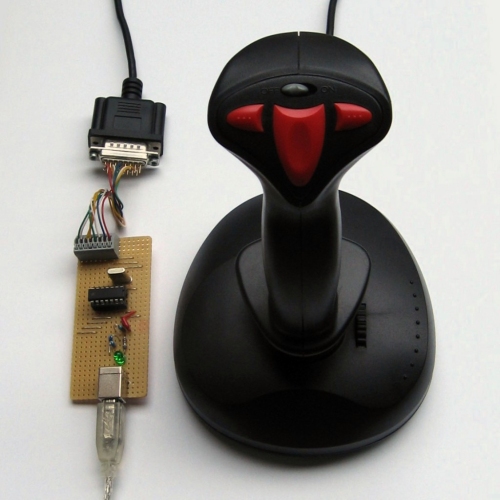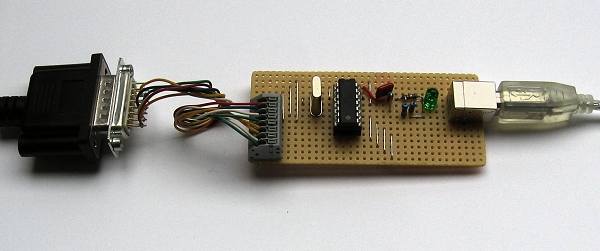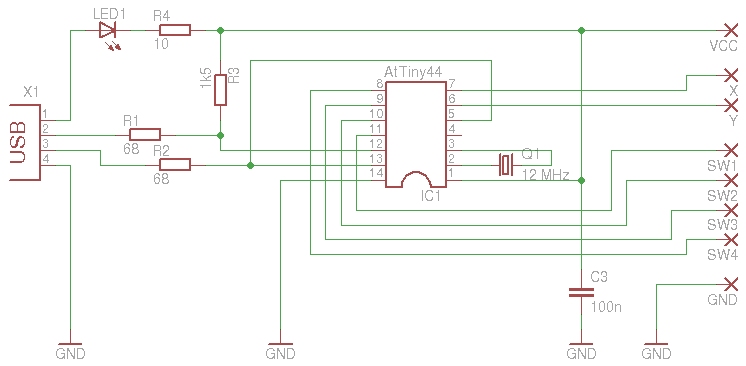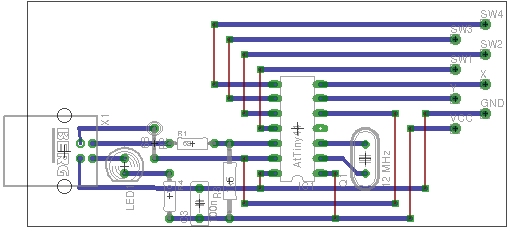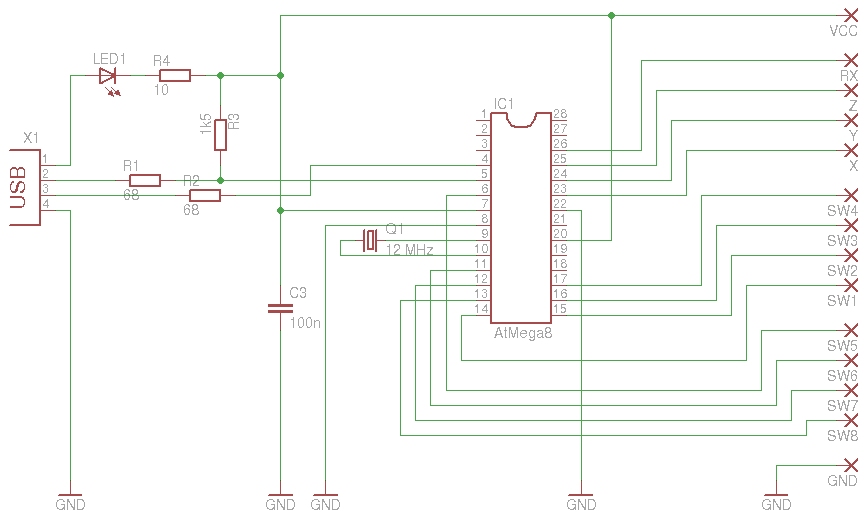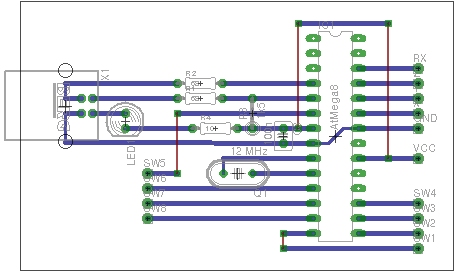 Joystick-Controller mit Bascom-SWUSB
Joystick-Controller mit Bascom-SWUSB
Ich
habe noch einen alten analogen Joystick herumliegen - aber keinen
Rechner mehr, der einen passenden Gameport-Anschluss aufweist. Zu neuem
Leben ließ er sich mit einem AVR-Mikrocontroller und der
SWUSB-Library erwecken.
Die von Rick Richards entwickelte SWUSB-Library ist das Bascom-Gegenstück zur VUSB-Library von http://www.obdev.at/vusb .
Der
Kern, die Library swusb.lbx und ein include-File sowie (derzeit) zwei
Beispielimplementationen (ein Gamepad und ein Keyboard) finden sich
unter http://www.sloservers.com/swusb .
Ich
habe sein Gamepad-Beispiel für einen Joystick abgewandelt und auf
einen AtTiny44 bzw. AtTiny84 portiert (der Joystick hat nur 2 Achsen
und 4 Taster, so dass die verfügbaren Pins eines AtTiny44 gerade
so reichen).
Da das gut klappte, habe ich mit den
HID-Descriptoren herumgespielt und Lösungen für
umfangreichere Joysticks gefunden; z.B für Joysticks mit einem
zusätzlichen Schubregler und einem HatSwitch (auch als Coolie
Switch oder POV bekannt).
Eine weitere Lösung bietet 4
Achsen und 8 Taster - sie wäre geeignet, um aus der Mechanik eines
abgewrackten Fernsteuersenders (mit zwei Steuerknüppeln) einen
PC-Trainer für PC-Modellflug-Simulatoren zu bauen.
Hardware
Die USB-Anschaltung an den Mikrocontroller ist die gleiche wie bei den VUSB-Projekten.
Beim
Attiny44/84 gibt es eine kleine Besonderheit: D+ muss an INT0
(PB2) liegen, aber auf PortB ist kein weiterer Pin frei.
Glücklicherweise kann man als USB-Datenpins z.B. PA0 and PA1
nutzen und
PB2 zusätzlich mit D+ verbinden. PA0 und PA1 übertragen dann
die Daten,
während PB2 nur die Interrupts auslöst. Die Potis bilden
einen Spannungsteiler zwischen VCC und Masse, und die Taster bzw.
Schalter tasten gegen Masse.
Bei
Verwendung eines alten analogen Joysticks ist jedoch zu beachten, dass
die intern verbauten Potentiometer nicht als Spannungsteiler beschaltet
sind, sondern lediglich einseitig an Plus 5V liegen.
Es
gibt zwei Lösungsmöglichkeiten: Wenn man im Inneren des
Joysticks eine Masseleitung findet, kann man den freien Anschluss der
Potis an Masse legen (dabei sollte man zur Sicherheit kontrollieren, ob
Plus wirklich am anderen Ende des Potis liegt und nicht etwa am
Schleifer des Potis!). Ist dies nicht der Fall, kann man auf der
Platine die ADC-Eingänge mit etwa 10 kOhm gegen Masse ziehen. Der
Joystick-Widerstand von 100 kOhm und der 10-kOhm-Widerstand bilden dann
einen Spannungsteiler. Nachteilig ist, dass die Spannung dann nicht
mehr linear vom Drehwinkel des Joystick-Potentiometers abhängt und
minimal 0,5 V statt 0 V beträgt.
Die Joystick-Potis
überstreichen ohnehin nicht den gesamten Widerstandsbereich,
sondern nur einen Teil (daher sehen die Joystick-Treiber bzw. die
Anwendungsprogramme eine Joystick-Kalibrierung vor, so dass man den
verschobenen Nullpunkt "wegkalibrieren" kann).
Der AtMega8-Schaltplan stellt den "Hardware-Maximalausbau" für 4 Achsen und 8 Taster / Schalter dar.
Software
Ollopas
Gamepad-Beispiel-Implementation habe ich nur ansatzweise verstanden,
aber glücklicherweise erkennt man leicht die Stellen, an denen man
sich in seinen Code mit seiner eigenen Task einhängen kann.
Das
größte Hindernis war auch hier, an funktionierende
HID-Deskriptoren für die verschiedenen Joystick-Varianten zu
kommen. Linux ist recht tolerant, aber Windows bemeckert jeden kleinen
Fehler mit "der Treiber kann nicht gestartet werden (Code 10)", obwohl
die HID-Spezifikation eigentlich vorsieht, dass das Betriebssystem
unverständliche Teile übergehen und den Rest ausführen
soll.
Eine gewisse Hilfe war ein HID-Parser namens Dt.exe dt_2.4.zip, der unter http://www.usb.org/developers/hidpage
zu finden ist. Die syntaktische Prüfung durch das Tool ist zwar
eher nutzlos, aber man kann sich einige Beispiele für
funktionierende HID-Deskriptoren herauskopieren.
Die
Länge eines geänderten HID-Deskriptors ist im Bascom-Code an
zwei (!) Stellen anzupassen (die zweite ist knapp 20 Zeilen oberhalb
des eigentlichen Deskriptors).
Den zentralen Teil, die Abfrage
der AD-Wandler und das Umsetzen in USB-Telegramme, findet man um Zeile
270 herum; bei Weglassen oder Hinzufügen einer Achse muss ein Byte
weniger (bzw. mehr) in das Array _usb_tx_buffer2 geschrieben werden.
Außerdem muss die Anzahl der Nutzbytes angepasst werden, die beim
Aufruf der Funktion usb_send übergeben wird (also die Zahl hinter
_usb_tx_status2).
Kompilieren des Codes
Wegen
der restriktiven Lizenz für swusb.lbx habe ich dem Sourcecode
lediglich das File swusb-includes.bas beigefügt -swusb.lbx ist auf
der oben angegebenen Homepage des Projekts herunterzuladen und in den
BASCOM-Plugin-Ordner zu verschieben.
Fusen des AtTiny
Ein
fabrikfrischer Attiny muss für Quarzbetrieb ohne 1:8-Vorteiler
gefust werden; Watchdog und Browout sind nicht aktiviert:
Low Fuse = 0xFF High Fuse = 0xDF
Für AtMega8 lauten die Fusebytes:
Low Fuse = 0xFF High Fuse = 0xD9
Download: swusb-joysticks-soft.zip
' Using an external 12MHz crystal, swusb-includes.bas and swusb.lbx (the latter copied to the bascom plugins folder)
' swusb.lbx is copyrighted by Rick Richard (ollopa) and may only be used only for noncommercial purposes
' Low Fuse = 0xFF High Fuse = 0xD9
' Analog Joystick with 2 Axis and 4 Buttons
' Analog input: PC0 and PC1
' Buttons 1-4: PB0 - PB3
'$noramclear 'Save about 38 bytes of code size
$hwstack = 30
$swstack = 30
$framesize = 40 '24 bytes reserved
$regfile = "m8def.dat"
$crystal = 12000000
$eepromhex 'for STK500 programmer
'Include the software USB library
$lib "swusb.lbx"
$external _swusb
$external Crcusb
Declare Sub Usb_reset()
Declare Sub Usb_processsetup(txstate As Byte)
Declare Sub Usb_send(txstate As Byte , Byval Count As Byte)
Declare Sub Usb_senddescriptor(txstate As Byte , Maxlen As Byte)
Declare Function Crcusb(buffer() As Byte , Count As Byte) As Word
'*******************************************************************************
'*************************** Begin USB Configuration ***************************
'
'Set the following parameters to match your hardware configuration and USB
'device parameters.
'******************************* USB Connections *******************************
'Define the AVR port that the two USB pins are connected to
_usb_port Alias Portd
_usb_pin Alias Pind
_usb_ddr Alias Ddrd
'Define the D+ and D- pins. (put D+ on an interrupt pin)
Const _usb_dplus = 2
Const _usb_dminus = 3
'Configure the pins as inputs
Config Pind.2 = Input
Config Pind.3 = Input
'disable pullups
_usb_port._usb_dplus = 0
_usb_port._usb_dminus = 0
'*******************************************************************************
'************************* USB Configuration Constants *************************
'Use EEPROM or FLASH to store USB descriptors
'1 = EEPROM, 0 = FLASH. Storing to EEPROM will reduce code size slightly.
Const _usb_use_eeprom = 0
'Don't wait for sent packets to be ACK'd by the host before marking the
'transmission as complete. This option breaks the USB spec but improves
'throughput with faster polling speeds.
'This may cause reliability issues. Should leave set to 0 to be safe.
Const _usb_assume_ack = 0
' *************************** Device Descriptor *****************************
'USB Vendor ID and Product ID (Assigned by USB-IF)
Const _usb_vid = &HAAAA
Const _usb_pid = &HEF04 ' --------------------------
'USB Device Release Number (BCD)
Const _usb_devrel = &H0001
'USB Release Spec (BCD)
Const _usb_spec = &H0110
'USB Device Class, subclass, and protocol (assigned by USB-IF).
'&h00 = Class defined by interface. (HID is defined in the interface)
'&hFF = Vendor-defined class (You must write your own PC driver)
'See http://www.usb.org/developers/defined_class for more information
Const _usb_devclass = 0
Const _usb_devsubclass = 0
Const _usb_devprot = 0
'These are _indexes_ to UNICODE string descriptors for the manufacturer,
'product name, and serial number. 0 means there is no descriptor.
Const _usb_imanufacturer = 1
Const _usb_iproduct = 2
Const _usb_iserial = 0
'Number of configurations for this device. Don't change this unless
'you know what you are doing. Ordinarily it should just be 1.
Const _usb_numconfigs = 1
' *************************** Config Descriptor *****************************
'The number of interfaces for this device (Typically 1)
Const _usb_numifaces = 1
'Configuration Number (do not edit)
Const _usb_confignum = 1
'Index of UNICODE string descriptor that describes this config (0 = None)
Const _usb_iconfig = 2
'&H80 = device powered from USB bus.
'&HC0 = self-powered (has a power supply)
Const _usb_powered = &HC0
'Required current in 2mA increments (500mA max)
Const _usb_maxpower = 150 '150 * 2mA = 300mA
' ************************** Interface Descriptor ***************************
'Number of interfaces for this device (1 or 2)
Const _usb_ifaces = 1
'Interface number
Const _usb_ifaceaddr = 0
'Alternate index
Const _usb_alternate = 0
'Number of endpoints for this interface (excluding endp 0)
Const _usb_ifaceendpoints = 1
'USB Interface Class, subclass, and protocol (assigned by USB-IF).
'&h00 = RESERVED
'&hFF = Vendor-defined class (You must write your own PC driver)
' Other values are USB interface device class. (such as HID)
'See http://www.usb.org/developers/defined_class for more information
Const _usb_ifclass = 3
Const _usb_ifsubclass = 0
Const _usb_ifprotocol = 0
'Index to UNICODE string descriptor for this interface (0 = None)
Const _usb_iiface = 0
' ************************* Optional HID Descriptor *************************
'HID class devices are things like keyboard, mouse, joystick.
'See http://www.usb.org/developers/hidpage/ for the specification,
'tools, and resources.
'Note that for a HID device, the device class, subclass, and protocol
'must be 0. The interface class must be 3 (HID).
'Interface subclass and protocol must be 0 unless you are making a
'keyboard or a mouse that supports the predefined boot protocol.
'See pages 8 and 9 of the HID 1.11 specification PDF.
'Number of HID descriptors (EXCLUDING report and physical)
'If you are not making a HID device, then set this constant to 0
Const _usb_hids = 1
'BCD HID releasenumber. Current spec is 1.11
Const _usb_hid_release = &H0111
'Country code from page 23 of the HID 1.11 specifications.
'Usually the country code is 0 unless you are making a keyboard.
Const _usb_hid_country = 0
'The number of report and physical descriptors for this HID
'Must be at least 1! All HID devices have at least 1 report descriptor.
Const _usb_hid_numdescriptors = 1
'Use a software tool to create the report descriptor and $INCLUDE it.
' ************************* Endpoint Descriptor(s) **************************
'Endpoint 0 is not included here. These are only for optional
'endpoints.
'Note: HID devices require 1 interrupt IN endpoint
'Address of optional endpoints (Must be > 0. comment-out to not use)
Const _usb_endp2addr = 1
'Const _usb_Endp3Addr = 2
'Valid types are 0 for control or 3 for interrupt
Const _usb_endp2type = 3
Const _usb_endp3type = 0
'Directions are: 0=Out, 1=In. Ignored by control endpoints
Const _usb_endp2direction = 1
Const _usb_endp3direction = 0
'Polling interval (ms) for interrupt endpoints. Ignored by control endpoints
' (Must be at least 10)
Const _usb_endp2interval = 10
Const _usb_endp3interval = 10
'*******************************************************************************
'The includes need to go right here--between the configuration constants above
'and the start of the program below. The includes will automatically calculate
'constants based on the above configuration, dimension required variables, and
'allocate transmit and receive buffers. Nothing inside the includes file needs
'to be modified.
$include "swusb-includes.bas"
'*******************************************************************************
'**************************** USB Interrupt And Init ***************************
'Set all the variables, flags, and sync bits to their initial states
Call Usb_reset()
Const _usb_intf = Intf0
Config Int0 = Rising
On Int0 Usb_isr Nosave
Enable Int0
Enable Interrupts
'*******************************************************************************
'*************************** End Of USB Configuration **************************
Config Portb = Input
Portb = &B00111111 'enable pullups
Config Portc = Input
Portc = &B00111100
Config Portd = Input 'enable pullups
Portd = Portd Or &B11110011
Config Adc = Single , Prescaler = Auto , Reference = Avcc
Start Adc
Dim Resetcounter As Word
Dim Idlemode As Byte
Dim X As Word
Dim Y As Word
Do
Resetcounter = 0
'Check for reset here
While _usb_pin._usb_dminus = 0
Incr Resetcounter
If Resetcounter = 1000 Then
Call Usb_reset()
End If
Wend
'Check for received data
If _usb_status._usb_rxc = 1 Then
If _usb_status._usb_setup = 1 Then
'Process a setup packet/Control message
Call Usb_processsetup(_usb_tx_status)
'else
End If
'Reset the RXC bit and set the RTR bit (ready to receive a new packet)
_usb_status._usb_rtr = 1
_usb_status._usb_rxc = 0
End If
'Queue data to be sent on endpoint 2 (HID report)
If _usb_tx_status2._usb_txc = 1 Then
X = Getadc(0) / 4
Y = Getadc(1) / 4
_usb_tx_buffer2(2) = Low(x) + 128
_usb_tx_buffer2(3) = Low(y) + 128
_usb_tx_buffer2(4) = Not Pinb 'Button data
Call Usb_send(_usb_tx_status2 , 3)
End If
Loop
End
'*******************************************************************************
'******************** Descriptors stored in EEPROM or FLASH ********************
' Do not change the order of the descriptors!
'
#if _usb_use_eeprom = 1
$eeprom
#else
$data
#endif
'Device Descriptor
_usb_devicedescriptor:
Data 18 , 18 , _usb_desc_device , _usb_specl , _usb_spech , _usb_devclass
Data _usb_devsubclass , _usb_devprot , 8 , _usb_vidl , _usb_vidh , _usb_pidl
Data _usb_pidh , _usb_devrell , _usb_devrelh , _usb_imanufacturer
Data _usb_iproduct , _usb_iserial , _usb_numconfigs
'Retrieving the configuration descriptor also gets all the interface and
'endpoint descriptors for that configuration. It is not possible to retrieve
'only an interface or only an endpoint descriptor. Consequently, this is a
'large transaction of variable size.
_usb_configdescriptor:
Data _usb_descr_total , 9 , _usb_desc_config , _usb_descr_totall
Data _usb_descr_totalh , _usb_numifaces , _usb_confignum , _usb_iconfig
Data _usb_powered , _usb_maxpower
'_usb_IFaceDescriptor
Data 9 , _usb_desc_iface , _usb_ifaceaddr , _usb_alternate
Data _usb_ifaceendpoints , _usb_ifclass , _usb_ifsubclass , _usb_ifprotocol
Data _usb_iiface
#if _usb_hids > 0
'_usb_HIDDescriptor
Data _usb_hid_descr_len , _usb_desc_hid , _usb_hid_releasel , _usb_hid_releaseh
Data _usb_hid_country , _usb_hid_numdescriptors
'Next follows a list of bType and wLength bytes/words for each report and
'physical descriptor. There must be at least 1 report descriptor. In practice,
'There are usually 0 physical descriptors and only 1 report descriptor.
Data _usb_desc_report
Data 50 , 0
'End of report/physical descriptor list
#endif
#if _usb_endpoints > 1
'_usb_EndpointDescriptor
Data 7 , _usb_desc_endpoint , _usb_endp2attr , _usb_endp2type , 8 , 0
Data _usb_endp2interval
#endif
#if _usb_endpoints > 2
'_usb_EndpointDescriptor
Data 7 , _usb_desc_endpoint , _usb_endp3attr , _usb_endp3type , 8 , 0
Data _usb_endp3interval
#endif
#if _usb_hids > 0
_usb_hid_reportdescriptor:
Data 50 ' Length
Data &H5 , &H1 ' USAGE_PAGE (Generic Desktop)
Data &H9 , &H4 ' USAGE (Joystick)
Data &HA1 , &H1 ' COLLECTION (Application)
Data &H9 , &H1 ' USAGE (pointer)
Data &HA1 , &H0 ' COLLECTION (Physical)
Data &H5 , &H1 ' USAGE_PAGE (Generic Desktop)
Data &H9 , &H30 ' USAGE (X)
Data &H9 , &H31 ' USAGE (Y)
Data &H15 , &H81 ' LOGICAL_MINIMUM (-127)
Data &H25 , &H7F ' LOGICAL_MAXIMUM (127)
Data &H75 , &H8 ' REPORT_SIZE (8)
Data &H95 , &H2 ' REPORT_COUNT (2)
Data &H81 , &H82 ' INPUT (Data,Var,Abs,Volatile)
Data &HC0 ' END_COLLECTION
Data &H5 , &H9 ' USAGE_PAGE (Button)
Data &H19 , &H1 ' USAGE_MINIMUM (Button 1)
Data &H29 , &H4 ' USAGE_MAXIMUM (Button 4)
Data &H25 , &H1 ' LOGICAL_MAXIMUM (1)
Data &H15 , &H0 ' LOGICAL_MINIMUM (0)
Data &H95 , &H4 ' REPORT_COUNT (8)
Data &H75 , &H1 ' REPORT_SIZE (1)
Data &H81 , &H2 ' INPUT (Data,Var,Abs)
Data &H75 , &H1 ' REPORT_SIZE (1)
Data &H95 , &H4 ' REPORT_COUNT (1)
Data &H81 , &H1 ' INPUT (Constant)
Data &HC0 ' END_COLLECTION
#endif
'*****************************String descriptors********************************
'Yes, they MUST be written like "t","e","s","t". Doing so pads them with
'0's. If you write it like "test," I promise you it won't work.
'Default language descriptor (index 0)
_usb_langdescriptor:
Data 4 , 4 , _usb_desc_string , 09 , 04 '&h0409 = English
'Manufacturer Descriptor (unicode)
_usb_mandescriptor:
Data 14 , 14 , _usb_desc_string
Data "o" , "l" , "l" , "o" , "p" , "a"
'Product Descriptor (unicode)
_usb_proddescriptor:
Data 44 , 44 , _usb_desc_string
Data "o" , "l" , "l" , "o" , "p" , "a" , "'" , "s" , " " , "j" , "o" , "y" , "s" , "t" , "i" , "c" , "k"
Data " " , "1" , "." , "0"
'*******************************************************************************
'*******************************************************************************
'******************************** Subroutines **********************************
'*******************************************************************************
Sub Usb_processsetup(txstate As Byte)
Senddescriptor = 0
'Control transfers reset the sync bits like so
Txstate = _usb_setup_sync
'These are the standard device, interface, and endpoint requests that the
'USB spec requires that we support.
Select Case _usb_rx_buffer(2)
'Standard Device Requests
Case &B10000000:
Select Case _usb_rx_buffer(3)
' CASE _usb_REQ_GET_STATUS:
Case _usb_req_get_descriptor:
Select Case _usb_rx_buffer(5)
Case _usb_desc_device:
'Send the device descriptor
#if _usb_use_eeprom = 1
Readeeprom _usb_eepromaddrl , _usb_devicedescriptor
#else
Restore _usb_devicedescriptor
#endif
Senddescriptor = 1
Case _usb_desc_config:
'Send the configuration descriptor
#if _usb_use_eeprom = 1
Readeeprom _usb_eepromaddrl , _usb_configdescriptor
#else
Restore _usb_configdescriptor
#endif
Senddescriptor = 1
Case _usb_desc_string:
Select Case _usb_rx_buffer(4)
Case 0:
'Send the language descriptor
#if _usb_use_eeprom = 1
Readeeprom _usb_eepromaddrl , _usb_langdescriptor
#else
Restore _usb_langdescriptor
#endif
Senddescriptor = 1
Case 1:
'Send the manufacturer descriptor
#if _usb_use_eeprom = 1
Readeeprom _usb_eepromaddrl , _usb_mandescriptor
#else
Restore _usb_mandescriptor
#endif
Senddescriptor = 1
Case 2:
'Send the product descriptor
#if _usb_use_eeprom = 1
Readeeprom _usb_eepromaddrl , _usb_proddescriptor
#else
Restore _usb_proddescriptor
#endif
Senddescriptor = 1
End Select
End Select
' CASE _usb_REQ_GET_CONFIG:
End Select
Case &B00000000:
Select Case _usb_rx_buffer(3)
' CASE _usb_REQ_CLEAR_FEATURE:
' CASE _usb_REQ_SET_FEATURE:
Case _usb_req_set_address:
'USB status reporting for control writes
Call Usb_send(txstate , 0)
While Txstate._usb_txc = 0 : Wend
'We are now addressed.
_usb_deviceid = _usb_rx_buffer(4)
' CASE _usb_REQ_SET_DESCRIPTOR:
Case _usb_req_set_config:
'Have to do status reporting
Call Usb_send(txstate , 0)
End Select
'Standard Interface Requests
Case &B10000001:
Select Case _usb_rx_buffer(3)
' CASE _usb_REQ_GET_STATUS:
' CASE _usb_REQ_GET_IFACE:
Case _usb_req_get_descriptor
'_usb_rx_buffer(4) is the descriptor index and (5) is the type
Select Case _usb_rx_buffer(5)
Case _usb_desc_report:
#if _usb_use_eeprom = 1
Readeeprom _usb_eepromaddrl , _usb_hid_reportdescriptor
#else
Restore _usb_hid_reportdescriptor
#endif
Senddescriptor = 1
' CASE _usb_DESC_PHYSICAL
' CASE _USB_DESC_HID
End Select
End Select
'CASE &B00000001:
'SELECT CASE _usb_rx_buffer(3)
' CASE _usb_REQ_CLEAR_FEATURE:
' CASE _usb_REQ_SET_FEATURE:
' CASE _usb_REQ_SET_IFACE:
'END SELECT
'Standard Endpoint Requests
'CASE &B10000010:
'SELECT CASE _usb_rx_buffer(3)
' CASE _usb_REQ_GET_STATUS:
'END SELECT
'CASE &B00000010:
'SELECT CASE _usb_rx_buffer(3)
' CASE _usb_REQ_CLEAR_FEATURE:
' CASE _usb_REQ_SET_FEATURE:
'END SELECT
'Class specific requests (useful for HID)
'CASE &b10100001:
'Class specific GET requests
'SELECT CASE _usb_rx_buffer(3)
'CASE _usb_REQ_GET_REPORT:
'CASE _usb_REQ_GET_IDLE:
'CASE _usb_REQ_GET_PROTOCOL:
'END SELECT
'0-byte answer
'Call Usb_Send(TxState, 0)
Case &B00100001:
'Class specific SET requests
Select Case _usb_rx_buffer(3)
'CASE _usb_REQ_SET_REPORT:
Case _usb_req_set_idle:
Idlemode = 1
'Do status reporting
Call Usb_send(txstate , 0)
'CASE _usb_REQ_SET_PROTOCOL:
End Select
End Select
If Senddescriptor = 1 Then
Call Usb_senddescriptor(txstate , _usb_rx_buffer(8))
End If
End Sub
Sub Usb_senddescriptor(txstate As Byte , Maxlen As Byte)
'Break the descriptor into packets and send to TxState
Local Size As Byte
Local I As Byte
Local J As Byte
Local Timeout As Word
#if _usb_use_eeprom = 1
'EEPROM access is a little funky. The size has already been fetched
'and stored in _usb_EEPROMADDRL, and the address of the descriptor
'is now in the EEAR register pair.
Size = _usb_eepromaddrl
'Fetch the location of the descriptor and use it as an address pointer
push R24
in R24, EEARL
sts {_USB_EEPROMADDRL}, R24
in R24, eearH
sts {_USB_EEPROMADDRH}, R24
pop R24
#else
Read Size
#endif
If Maxlen < Size Then Size = Maxlen
I = 2
For J = 1 To Size
Incr I
#if _usb_use_eeprom = 1
Incr _usb_eepromaddr
Readeeprom Txstate(i) , _usb_eepromaddr
#else
Read Txstate(i)
#endif
If I = 10 Or J = Size Then
I = I - 2
Call Usb_send(txstate , I)
While Txstate._usb_txc = 0
Timeout = 0
'To prevent an infinite loop, check for reset here
While _usb_pin._usb_dminus = 0
Incr Timeout
If Timeout = 1000 Then '
Call Usb_reset()
Exit Sub
End If
Wend
Wend
I = 2
End If
Next
End Sub
Sub Usb_send(txstate As Byte , Byval Count As Byte)
'Calculates and adds the CRC16,adds the DATAx PID,
'and signals to the ISR that the data is ready to be sent.
'
'"Count" is the DATA payload size. Range is 0 to 8. Do not exceed 8!
'Reset all the flags except TxSync and RxSync
Txstate = Txstate And _usb_syncmask
'Calculate the 16-bit CRC
_usb_crc = Crcusb(txstate(3) , Count)
'Bytes to transmit will be PID + DATA payload + CRC16
Count = Count + 3
Txstate = Txstate + Count
Txstate(count) = Low(_usb_crc)
Incr Count
Txstate(count) = High(_usb_crc)
'Add the appropriate DATAx PID
Txstate(2) = _usb_pid_data1
If Txstate._usb_txsync = 0 Then
Txstate(2) = _usb_pid_data0
End If
'The last step is to signal that the packet is Ready To Transmit
Txstate._usb_rtt = 1
Txstate._usb_txc = 0
End Sub
Sub Usb_reset()
'Reset the receive flags
_usb_status._usb_rtr = 1
_usb_status._usb_rxc = 0
'Reset the transmit flags
_usb_tx_status = _usb_endp_init
#if Varexist( "_usb_Endp2Addr")
_usb_tx_status2 = _usb_endp_init
#endif
#if Varexist( "_usb_Endp3Addr")
_usb_tx_status3 = _usb_endp_init
#endif
'Reset the device ID to 0
_usb_deviceid = 0
Idlemode = 0
End Sub
 Joystick-Controller mit Bascom-SWUSB
Joystick-Controller mit Bascom-SWUSB  Joystick-Controller mit Bascom-SWUSB
Joystick-Controller mit Bascom-SWUSB 